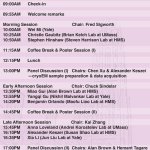I would like to invite you to a one day conference on Imaging Mass Spectrometry and Omics Symposium that will be held at YSPH tomorrow on November 22, 2019. The flyer is attached.
Tissue Imaging Flyer2019_v3[1].pdf
Statseminars S&DS Talk, Speaker: Weijie Su, 10/28, “Gaussian Differential Privacy”, DL220
MONDAY, OCTOBER 28, 2019
Department of Statistics and Data Science
Weijie Su, University of Pennsylvania, Wharton School
Monday, October 28, 2019
4:00PM to 5:15PM
Dunham Lab. see map
10 Hillhouse Avenue, 2nd Floor, Room 220
New Haven, https://statistics.yale.edu/seminars/weijie-su-0
Title: Gaussian Differential Privacy
Information and Abstract: Privacy-preserving data analysis has been put on a firm mathematical foundation since the introduction of differential privacy (DP) in 2006, with its deployment on iOS and Chrome lately. This privacy definition, however, has some well-known weaknesses: notably, it does not tightly handle composition. This weakness has inspired several recent relaxations of differential privacy based on Renyi divergences. We propose an alternative relaxation of differential privacy, which we term “f-DP”, which has a number of nice properties and avoids some of the difficulties associated with divergence based relaxations. First, it preserves the hypothesis testing interpretation of differential privacy, which makes its guarantees easily interpretable. It allows for lossless reasoning about composition and post-processing, and notably, a direct way to analyze privacy amplification by subsampling. We define a canonical single-parameter family of definitions within our class that is termed “Gaussian Differential Privacy”, based on hypothesis testing of two shifted normal distributions. We prove that this family is focal to f-DP by introducing a central limit theorem, which shows that the privacy guarantees of any hypothesis-testing based definition of privacy (including differential privacy) converge to Gaussian differential privacy in the limit under composition. This central limit theorem also gives a tractable analysis tool. We demonstrate the use of the tools we develop by giving an improved analysis of the privacy guarantees of noisy stochastic gradient descent.
This is joint work with Jinshuo Dong and Aaron Roth.
3:45 p.m. Pre-talk tea Dunham Lab, Suite 222, Breakroom 228
For more details and upcoming events visit our website at
http://statistics.yale.edu/ .
Computation and Society Website and Upcoming Events
The initial website for the Computation and Society Initiative just got live:
YINS Today@1pm: Crash Course on GANs with Mario Lucic (Google Brain)
for those interested, let’s walk from bass around 12:30p
Welcome | MB&B Intranet
Data.gov
useful site
gcloud slides
link for slides:
https://www.slideshare.net/slideshow/embed_code/131112436
photos in today’s dropbox
YINS Tomorrow@12: Robust Learning with Applications to Health Analytics
“Distributionally Robust Learning with Applications to Health Analytics”
Speaker: Yannis Paschalidis
Boston University
http://sites.bu.edu/paschalidis/ (link is external)
Wednesday, April 17, 2019 – 12:00pm
Yale Institute for Network Science, 17 Hillhouse Avenue, 3rd floor Abstract: We will present a distributionally robust optimization approach to learning predictive models, using general loss functions that can be used either in the context of classification or
regression. Motivated by medical applications, we assume that training data are contaminated with (unknown) outliers. The learning problem is formulated as the problem of minimizing the worst case expected loss over a family of distributions within a certain Wasserstein ball centered at the empirical distribution obtained from the training data. We will explore the generality of this approach, its robustness properties, its ability to explain a host of “ad-hoc” regularized learning methods, and we will establish rigorous out-of-sample performance guarantees.
Beyond predictions, we will discuss methods that can leverage the robust predictive models to make decisions and offer specific personalized prescriptions and recommendations to improve future outcomes. We will provide some examples of medical applications of our methods, including predicting hospitalizations for chronic disease patients, predicting hospital length-of-stay for surgical patients, and making treatment recommendations for diabetes and hypertension. Speaker Bio: Yannis Paschalidis is a Professor and Data Science Fellow in Electrical and Computer Engineering, Systems Engineering, and Biomedical Engineering at Boston University. He is the Director of the Center for Information and Systems Engineering (CISE). He obtained a Diploma (1991) from the National Technical University of Athens, Greece, and an M.S. (1993) and a Ph.D. (1996) from the Massachusetts Institute of Technology (MIT), all in Electrical Engineering and Computer Science. He has been at Boston University since 1996. His current research interests lie in the fields of systems and control, networks, optimization, operations research, computational biology, and medical informatics.
Prof. Paschalidis’ work has been recognized with a CAREER award (2000) from the National Science Foundation, the second prize in the 1997 George E. Nicholson paper competition by INFORMS, the best student paper award at the 9th Intl. Symposium of Modeling and Optimization in Mobile, Ad Hoc, and Wireless Networks (WiOpt 2011) won by one of his Ph.D. students for a joint paper, an IBM/IEEE Smarter Planet Challenge Award, and a finalist best paper award at the IEEE International Conference on Robotics and Automation (ICRA). His work on protein docking (with his collaborators) has been recognized for best performance in modeling selected protein-protein complexes against 64 other predictor groups (2009 Protein Interaction Evaluation Meeting). His recent work on health informatics won an IEEE Computer Society Crowd Sourcing Prize. He was an invited participant at the 2002 Frontiers of Engineering Symposium organized by the National Academy of Engineering, and at the 2014 National Academies Keck Futures Initiative (NAFKI) Conference. Prof. Paschalidis is a Fellow of the IEEE and the founding Editor-in-Chief of the IEEE Transactions on Control of Network Systems.
gate.io
The helpdesk person I spoke to said to connect to the network through other means and try going to
Great fix after passwd change

